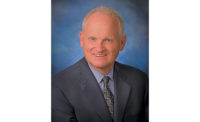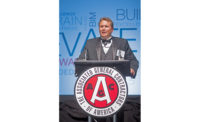For Tim White, founder and chairman of White Construction Group in Castle Rock, Colo., the mixed-use Steam on the Platte development was a perfect fit for him and his company—a complicated project that, in White’s words, had “hair on it.”
According to White, the warehouse complex at 1401 Zuni St. in Denver—only a block from the South Platte River and near Mile High Stadium and the interchange of interstates 70 and 25—consisted of five separate properties, each with its own deed of trust. Moreover, the location had a history dating back at least to 1917, when Russian-Jewish immigrants settled in the neighborhood and the local rabbi ran a large rag-baling business in the building, says developer Sue Powers of Urban Ventures.
White and Powers teamed up on the project, in what Powers calls “a marriage that we walked into without being engaged at all.” The two didn’t know each other, nor did they know that in November they would be sharing a Mayor’s Design Award for the iconic development with White Construction Group’s vice-chairman, Doug Decker, also a partner in the project.
The building, finished in September 2017, retains much of its industrial character, with an open design that reveals brickwork, air ducts and even old machinery. It’s something that Powers says White advocated from the start.
“He was very much leading the conversation about, ‘Let’s not screw up what’s there,’” Powers says. “He said, ‘We’ve got the bones of this building. Let’s just go back and take it to where it was, and not put in drywall offices and cover up all the beauty that’s here.’ It’s a magnificent building because we took that kind of approach to it, and he was really pushing that. He was not your typical contractor who encloses everything. He has a great understanding of existing buildings.”
White Construction Group also has renovated other landmarks, including Denver’s Trinity United Methodist Church, the Ninth Street Historic Park at the Auraria Higher Education Center in Denver and Stanley Marketplace in Aurora, Colo. For the marketplace, formerly the Stanley Aviation building, White spent three weeks in Europe visiting public markets so he could soak up their designs and ambience.
About the Stanley Marketplace, completed in 2016, White Construction Group President Chris Haugen says White is “able to assess a project not just from a construction standpoint. He catches the vision.”
Started as a One-Man Shop
White has been sharpening his focus since 1985, when he told his boss at Pinkard Construction in Lakewood, Colo., that he wanted to open his own firm. As White recalls, the answer was, “You can continue to work here as long as you can. If you need to take a few days off for your own company, you can do that.”
White’s wife was teaching in Castle Rock, located on I-25 midway between Denver and Colorado Springs. White set up a one-man shop there and soon partnered with a friend, developer Ken Ash, who stayed with White until 1992. The business continued as Ash & White Construction until 2003, when White renamed the company.
Early business consisted mainly of U.S. government contracts, including at Peterson Air Force Base in Colorado Springs, the former Lowry Air Force Base in Denver and the Denver Federal Center in Lakewood. Building upon that solid portfolio, White began to make his name and attract more clients.
“I’ve been very, very fortunate to be around people who have really given me opportunity and trusted me and challenged me all the way along,” White says. “The early days, even though they were challenging—and I don’t mean in a negative way, in a positive way—you were always doing something more today than you did yesterday, and trying to do it better than you did yesterday.
“And the people who surrounded me as clients, as owners, as consultants—I’ve just been real fortunate to be around some very, very qualified and quality folks who just believed in that type of culture. Even though it was a challenge, it was always an opportunity,” he says.
It’s that sort of experience, White says, that has led him to give opportunities to people throughout his firm. Haugen, for example, started 21 years ago as a carpenter. He planned to stay three months, but his wife became pregnant and he needed the paycheck. Haugen was a credentialed teacher, and after a year and a half, he began looking for jobs at local schools. That’s when White stepped in.
“He said, ‘I know you’re interested in leaving, but would you consider coming into the office, and we will train you to be a project manager and an estimator,’” Haugen says. “Every time another opportunity came up, Tim would never dismiss it or tell me, ‘Fine, hit the bricks, kid.’ He would say, ‘That’s an awesome opportunity. Would you maybe be interested in doing something else here or being exposed to more opportunity?’
“He always sensed that if somebody else was offering me an opportunity, then this kid maybe does have some potential and how can I better utilize him here? He is an entrepreneur by nature and always encourages people to better themselves.”
Haugen’s comments are echoed by Decker, who started with the company in 1990.
“He seems to figure out how to get the best out of people who work for him,” Decker says. “And he’s always been like that. He makes you better than you are.”
White’s interests have long extended beyond his own company, which now employs nearly 50 people. He and Decker own numerous commercial buildings together, and he has holdings in a variety of developments throughout the Denver area.
In addition to spending time with his five children, White is dedicated to Castle Rock and surrounding Douglas County. He’s the former mayor of Castle Rock; he served on the Douglas County Board of Education; and he’s currently president of the Intermountain Rural Electric Association.
White acknowledges that public service is good for business but also says, “The way I was raised, I suppose, it was just a mindset that you owed something to your community you were living in. I didn’t become mayor of Castle Rock because I wanted to get into politics. I just felt that I’d been in Castle Rock and I’d built some buildings … and I feel it’s one way you can pay it back.”
Now 69, White has no imminent plans to retire, although he stepped down as company president in April, retaining the title of chairman. His grandfather, he says, worked past the age of 90. There’s no guarantee White will do the same, but for now he’s happy developing several real-estate projects around metropolitan Denver.
“People in the construction business, almost every one of us, are gamblers and risk-takers,” he says. “I suppose what I like about it are the projects that are the challenges, the ones that have a lot of hair on them, but you can create some opportunities out of them. I just enjoy that challenge.”







Post a comment to this article
Report Abusive Comment